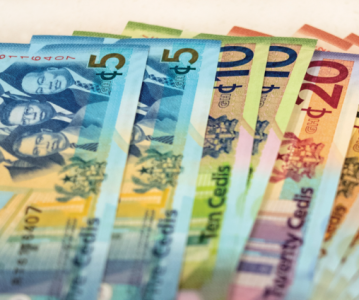Where the Run of National Economy Assumes Mad Horse Motion

The Bloomberg, an international entity that connect decision-makers the world over, to a dynamic network of information, people and ideas, and achieved fame for the quick and accurate delivery of business and financial information, news and insight around the world – to alert both national and corporate governments of matters culminating from higher in-to the common denomination of micro-economics of bread and butter, last weekend attended to Ghana’s issue.
Bloomberg reported that Ghana faces a looming fuel shortage as the central bank rations dollars after oil prices surged following Russia’s invasion of Ukraine. This report is interestingly arriving just after Ghana has the umpteenth time in recent time, increased cost of petroleum products to close to GH¢14,00 per litre, people decry.
The Anchor wasn’t surprised though, at the writhing in financial pain of the people on the streets at the regular uncontrolled increase of these energy product costs, but the exacerbated effect the revealed report would have on already over-burdened domestic users.
The paper is also awed but not astonished at the report that the monthly fuel import bill for Ghana jumping to $450 million in May, from $250 million in January, as snitched out by knowledgeable people, as far as, energy economy’s technicalities are concerned.
The Ghanaian central bank, the report said, is only offering about $100 million a month at its foreign exchange auctions, and licensed bulk distributors can no longer plug the shortfall in the black market.
The Anchor, like any other member of the sensitive moral society has been soliloquizing at the sensibility of a system that just would choose to kill its people, by continually tightening a noose of financial belt around their hapless waist and, turn deaf ears to their shrilled cry for succor. But the hardest the ordinary Ghanaian talks to themselves on the street as result of the harshest economic situation ever experience in the recent history of their country, the nearest they drive home the fact that an illness debilitatingly fatal, was what affecting the driving gears of the national economy: The fundamentals may have needed realignment, grooming and oiling, which clues were somewhat lacking.
It is the paper’s case that, since every little increment in fuel prices affect, consequentially, every facet of the people’s wellbeing, those in the driving seats of the wagon need equally being people with human-face prudence, full of wit around probable pitfall and imminent ditches.
It is, however, so vindicating that the only clue Ghana’s economy-drivers know best, was just slap a slab of additional cash layers without attempting to smoothen the already roughened-edges into palpable bear ability of the people.
It is our regret that the central bank finding itself in the quagmire of dollar management incongruity thereby is reluctant to spend ‘its limited dollars on importing fuel, though it’s also looking at ways to boost its foreign exchange holdings. This indeed places Ghanaians in the financial rock and the hard place, because, not only would they resort, come what may, to buying fuel at extremely expensive cost, but also would have to toil hard for looking for it on the market: a situation, we challenge, could grind the entire national economy to a halt.
If it’s indeed, true, which the Anchor wouldn’t doubt, that the central bank reserves stood at $8.34 billion at the end of April 2022 down from $9.7 billion at the end of last year, therefore affecting positive outflow of oil – a life-fluid that moves the nation, even upon all the free-hikes of domestic oil prices to leverage dollar inflow; we indeed, must be at our wit’s end.
Because, yes, the nation’s challenge has been increased as the cedi weakened 22% against the dollar this year, the worst performance among African currencies tracked by Bloomberg. Ghana’s inflation rate jumped to 27.6% in May, the highest level in more than 18 years, as food and transport costs surged.
The paper is also at a loss, observing with distress the operations, albeit, in theoretically eardrum’s rupturing garrulity of regulatory agencies entrusted with policy-formulation to get our oil flowing at a relatively cheaper cost to meet the ordinary Ghanaian’s meagre pay-pocket. Their talk has become cheaper, placing us where we are now; a precipice of a sort with only the Redeemer’s intervention as a bet.
Source: theanchorghana




